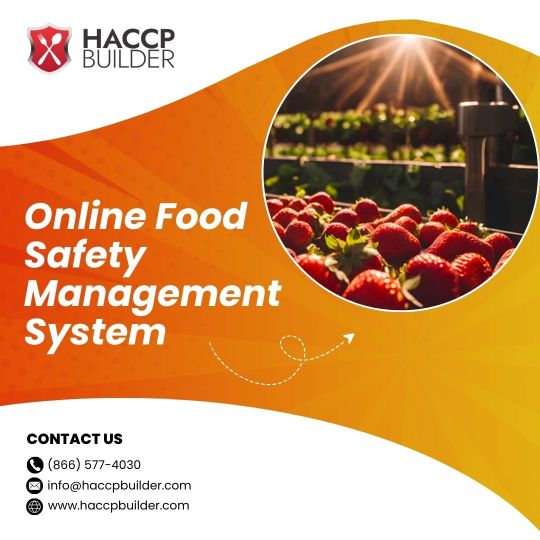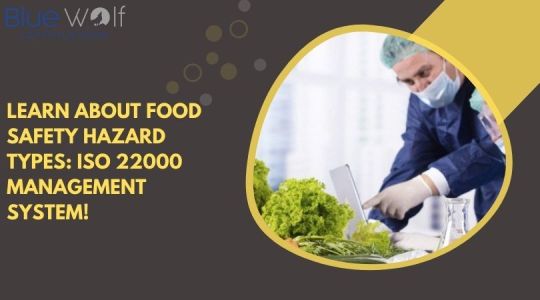#Food Safety Management System
Text
Online Food Safety Management System | HACCP Builder
An Online Food Safety Management System, streamlines the creation, implementation, and monitoring of HACCP plans, ensuring compliance with food safety regulations by identifying hazards, setting critical control points, and maintaining detailed records digitally.

#haccp monitoring system#haccp food management system#food safety management program#food safety management solutions#food safety management system#online food safety management system
1 note
·
View note
Text
What Is The Objective of the Food Safety Management System?
The need for a food safety management system was felt after the development of food businesses. Many people started selling edible items under different brand names. Also, they started using packaging technology to keep the edible items safe and extend their shelf-life. Food has a short shelf-life but it can be increased by treating the items.
Visit us - https://medium.com/@isostandards.usa/what-is-the-objective-of-the-food-safety-management-system-16e1822523b8
#iso 14001 environmental management system#iso environmental management system#Food Safety Management System#iso 27001 certification consultants#iso 27001 information security management system
0 notes
Text
A Hazard Analysis Critical Control Point (HACCP) system tries to reduce food safety risks and hazards. HACCP detects potential threats to public health and enables a proactive approach to food safety by establishing crucial control points.
The HACCP system identifies and regulates the three potential food safety hazards: biological, chemical, and physical. Companies that manufacture, process, or handle food items are encouraged to employ a HACCP plan to reduce or eliminate food safety hazards in their goods.
#HACCP Documents#HACCP#HACCP Certification#HACCP Training#food safety management system#food safety#Hazard Analysis Critical Control Points
0 notes
Text
The requirements for a food safety management system (FSMS) are outlined in ISO 22000, a global standard. Through the whole food supply chain, it offers a systemic and comprehensive approach to managing food safety threats. The ISO 22000 certification, which recognizes your dedication to guaranteeing the food safety of the food you supply, is a badge of honour for anyone who produces, processes, or distributes food.
#ISO 22000 manual#ISO 22000 documents#ISO 22000 certification#Food safety#food safety management#food safety management system#ISO 22000#FSMS
0 notes
Text
Stay Ahead in the Food Industry with Food Safety Management System Certification
A Food Safety Management System (FSMS) certification ensures that food products are safe for human consumption. It involves a systematic approach to managing food safety risks, including identifying potential hazards, implementing controls, and continuous monitoring. FSMS certification also enhances a company's reputation and increases consumer confidence in the safety and quality of its products. Certification is typically granted by third-party organizations after a rigorous audit process. Compliance with international standards such as ISO 22000 or the Hazard Analysis and Critical Control Points (HACCP) system is a common requirement for certification.
0 notes
Link
This food safety management system Auditor/Lead Auditor course has been designed and developed to provide learners with the knowledge and skills required to perform first, second and third-party audits of an FSMS as per ISO 22000:2018, in accordance with ISO 19011-2018, ISO TS/22003-2013 and ISO/IEC 17021-1:2015, as applicable.
#Lead Auditor Training#ISO 22000:2018#Food Safety Management System#FSMS#lead auditor course#lead auditor
0 notes
Text
Features of ISO 22000 Certification

Get to be familiar with ISO 22000:2018 Certification food safety management in the Maldives by perusing the underneath article.
ISO 22000:2018 Certification addresses food safety management. It is a counteraction-based food handling framework that perceives and hinders microbial, substance, and different risks in the food-based industry.
It is fitting to all associations, paying little notice to somewhere safe measures towards food cleanliness, which are locked in with any part of the pecking order and have to execute systems that dependably give safe things. The strategy for meeting any necessities of this Worldwide Standard can be refined by utilizing inside or possibly outside resources.
This Worldwide Standard ISO 22000:2018 Certificate decides requirements to engage an organization to configuration, complete, work, and stay up with the latest sanitation and security the chiefs' system highlighted giving things that, according to their arranged use, are ok for utilization for the buyer or end-client.
Elements of ISO 22000:2018 Certification
Execution of ISO 22000 Certification assists the organization with instilling the accompanying elements:
• To show consistency with material lawful and regulatory food taking care of necessities
• To evaluate and study client requirements and show similitude with those regularly agreed client necessities that relate to food taking care of, to update purchaser faithfulness
• To effectively bestow food dealing with issues to their suppliers, clients, and appropriate put people in the advanced pecking order supply.
• To ensure that the organization controls its communicated food taking care of the procedure
• To display such control to appropriate contributed people
• To search for a certificate or selection of its sterilization
the chiefs' structure by an external outsider, or make a self-assessment or self-declaration of change following this worldwide standard
Also, Check -->> ISO 22000 for Hotels
ISO 22000: 2018 Certification Is Worked Around Seven Principles
• Investigation of food hazards: Natural, chemical, or physical
• Recognizable proof of fundamental control centers: Unrefined components, accumulating, getting ready, flow, and usage
• Foundation of fundamental basic control focuses and preventive measures: For example, last cooking temperature and time
• Observing these basic control focuses
• Foundation of supportive exercises
• Keeping records
• Deliberate and standard examining of the system set up via independent untouchable outsider certificate bodies
Benefits of ISO 22000 Certification
Completing ISO 22000 Certificate will convey the going with benefits to your organization:
• An auditable standard with clear necessities which gives a design for the outsider certificate body
• Reasonable for regulators and controllers
• The construction lines up with the organization system stipulations of ISO 9001 and ISO 14001
• Empowers correspondence about risks with associates in the creation organization
• Framework approach, instead of thing approach
• Pertinent to all associations in the overall food stock organization
• Deliberate methodology reception
• Expanded due perseverance
• Dynamic correspondence on disinfection issues with suppliers, clients, regulators, and other contributed people implies that it is an overall worldwide standard
• Gives potential for harmonization of public standards
• Covers the greater part of the requirements of the ongoing retailer sterilization rules
• Consents to the Codex HACCP principles
• Gives correspondence of HACCP thoughts all around the world
• A productive and proactive method for managing food handling risks and improvement and execution of control measures
• Asset improvement inside and along the well-established packaging order
• All control means are presented to hazard examination
• Better post-cycle check and certification
• Further developed documentation and record keeping
Also, Check -->> For what reason is ISO 22000 significant in the food business?
ISO 22000 Certification process
To make the ISO 22000 Certification process basic and speedy. Recruiting a specialist will direct you and your business through the accompanying moves toward accomplishing ISO 22000 Certificate giving.
1. Gap Analysing Preparing
2. Testing
3. Documentation and Test Report
4. Process Review
5. External Review
6. Certification and more.
#ISO 22000#ISO 22000 Certification#ISO 22000 Certification in Maldives#iso 22000 food safety#iso 22000 food safety management system#ISO 22000 FSMS#food safety management system#FSMS
1 note
·
View note
Text
#process in management information system#security management in information security#security of management information system#data access management#data security management system#food and safety management#food management system#food safety and management system#ict security management
0 notes
Text
A Guide to Building Trust and Loyalty in Food Service Business
Cultivating trust and loyalty among customers, particularly those with food allergies, is indispensable in food service settings where dietary preferences and restrictions are as diverse as the dishes served. Establishing a bond built on transparency, safety, and exceptional service goes beyond mere transactions; it's all about fostering relationships that can withstand the test of time. This article delves into the pivotal strategies food service establishments can employ to earn their clientele's trust and inspire unwavering loyalty.
Trust is built over time through consistently delivering exceptional service, and loyalty follows when customers feel understood, respected, and safe.
Building Trust with Customers
Building trust with customers, particularly those with food allergies, involves a consistent commitment to safety, transparency, and excellent service. Here are key strategies to cultivate trust:
Be Transparent and Honest: Be upfront about your menu and the potential allergens in your food. Honesty fosters trust and is particularly crucial for customers with food allergies.
Ensure Safety: Implement rigorous food handling and preparation protocols to avoid cross-contact with allergens. Customers will trust your establishment when they feel their health is prioritized.
Maintain Consistency: Deliver consistent service quality, from the food quality to the attentiveness of the staff. Consistency signals reliability, building trust over time.
Acknowledge Mistakes: If a mistake happens, own up to it, apologize sincerely, and rectify the situation promptly. This demonstrates integrity and can strengthen trust.
A Guide to Fostering Loyalty
Loyal customers are invaluable to the long-term success of your establishment. They not only frequent your business but also recommend it to others. Here's how you can foster loyalty:
Provide Exceptional Service: Always aim to exceed customer expectations. A satisfied customer is likely to return and become a loyal patron.
Personalize the Experience: Remember regular customers, their preferences, and their allergies. Personal touches like these make customers feel valued and enhance their loyalty.
Encourage Feedback: Ask for feedback and show customers you value their input. Make necessary changes based on their suggestions, which can increase their loyalty.
Reward Loyalty: Implement a loyalty program or offer discounts to regular customers. Rewards give customers a tangible reason to return.
When dealing with allergic customers, their safety is the top priority. Their trust in your ability to cater to their dietary needs and prevent cross-contact with allergens is critical. Their loyalty stems from repeated positive experiences where they feel understood, cared for, and safe.
Maintain clear communication, offer allergen-free options, and train your staff adequately to handle food allergies.
In conclusion, ensuring clear and accessible communication regarding allergens in food packaging and labeling is vital. Factors like label design, multilingual labeling, symbols, packaging materials, and integrity are crucial in keeping us safe, especially those with food allergies.
Every detail matters in creating a safer food environment, from ensuring the labels are easy to read to selecting the right packaging materials to prevent cross-contact. These steps aren't just about meeting regulations but looking for each other's well-being. By prioritizing these aspects, we minimize risks and build trust and confidence in the products we consume.
Overall, it's a reminder of the personal impact of allergen awareness and the importance of taking it seriously in our everyday lives.
#Trust building#Loyalty fostering#Food service business#Customer relationships#Transparency#Safety commitment#Exceptional service#Consistency#Integrity#Customer feedback#Personalization#Allergen management#Cross-contact prevention#Customer safety#Loyalty programs#Reward systems#Communication#Allergen awareness#Labeling#Packaging#Regulatory compliance.
0 notes
Text
The Food Safety Management System Lead Auditor Certification is designed to incorporate a candidate with the knowledge and skills required to assess the compliance of Food Safety Management Systems set up under the requirements of ISO 22000:2018. Not just the international standard, but sector specific technical specifications for Prerequisite Programmes (PRPs) provided in ISO/TS 22002-1:2009 shall also be integrated with the Certification to intimate the participant with the needs of the international food sector.

#FSMS Lead Auditor#Food Safety Management System Lead Auditor Certification#HACCP COURSE#Food Safety Management
0 notes
Text
Mastering Food Safety: A Step-by-Step Guide
A Food Safety Management System (FSMS) is a comprehensive framework that ensures the safe handling, production, and distribution of food. This step-by-step guide covers essential elements such as food hygiene, labeling, allergen control, and additive management. It emphasizes thorough training, hazard planning, robust monitoring, and traceability systems. Implementing an FSMS involves creating a dedicated team and understanding the intricacies of food production processes to uphold safety standards effectively. Here is my blog:https://lead-academy.org/blog/food-safety-management-system/

0 notes
Text

HACCP Builder offers an online Food Safety Management System designed to simplify compliance with food safety regulations and HACCP guidelines.
#online Food Safety Management System#best food traceability software#haccp food management system#haccp based food safety program#haccp plan for food products#haccp plan for food industry
0 notes
Text
Learn About Food Safety Hazard Types: ISO 22000 Management System!
Do you know that around 128,000 people get hospitalized every year due to foodborne illness in the United States?
While the numbers are saddening, it's not surprising considering the complex supply chain of the food manufacturing industry.
This is why the ISO 22000 food safety management standard has made food hazard identification one of the foundational requirements of the standard.
Once you identify the potential food hazards threatening your company, you can easily create plans to eliminate them.
In today’s blog, we are looking at the different types of classifications of food hazards to spread awareness.
So, if you want to make your food products safe for consumption, continue reading!

What is a Food Safety Hazard?
A food safety hazard is an element or substance that can contaminate food materials and lead to health problems in consumers. Food contamination refers to the presence of hazards in food.
Contamination can occur at any step of the food supply chain, such as transition, harvesting, packaging, processing, serving, delivery, and storage.
It is one of the reasons why the ISO 22000 food safety management standard encourages hazard control in every domain of the food industry.
Furthermore, food hazards can be present in some food naturally, and at other times, some external source may introduce the hazard. Each food hazard type needs specific controls to eliminate them.
The Four Most Common Types of Food Hazards
Most experts classify food safety hazards into four categories: biological, physical, chemical, and allergens.
Biological hazards
Biological hazards primarily originate from living organisms. This type of hazard has its own sub-divisions, such as spore-forming bacteria, non-spore-forming bacteria, parasites, protozoa, and viruses.
Some common examples of biological food hazards are:
Bacteria
Fungi
Yeasts
Parasites
Viruses
These biological hazards are among the most common causes of outbreaks. They depend on:
Nutrients of the food
Its pH level
Time
Temperature
Oxygen
Moisture level
The most common sources of biological hazards include:
Raw materials
Water
Food handlers
Storage
Contact surfaces
Equipment
Pests
Chemical hazards
Chemical hazards have four classifications: naturally occurring, from packaging materials, added, and contaminates.
Naturally occurring chemical hazards are the ones that you can naturally find in any food, such as saponins from legumes. The rest of the chemical hazards contaminate the food intentionally or unintentionally through the supply chain.
Typical sources of chemical hazards include:
Raw materials
Heat treatment
Preservatives or additives
Cleaning agents
Soil conditioners
Physical hazards
Physical hazards refer to extraneous material or foreign objects that can result in injury or contamination.
This type of hazard can come from several sources, such as:
Product
Packaging
Plant
People
Premises
Metal fragments, stones, bones, and glass shards are common examples of physical hazards.
Allergens
Allergens are hazards caused by proteins. This type of hazard may affect some individual’s immune systems, making them dangerous to consume.
Since proteins are a natural part of the food system, preventing allergy hazards can be challenging. But a clever way to start is being transparent about the ingredients included in your food so the buyers can avoid the allergy-causing items.
The most common allergens include:
Eggs
Milk
Shellfish
Peanuts
Tree nuts
Wheat
Soybean
Fish
Sesame
Mustard
Mollusks
Sulfites or sulfur dioxide
Lupin
Celery
Summing Up
Once you identify which type of food hazard poses the most significant threat to your supply chain, you can use the food hazard assessment guidance of ISO 22000 food safety management standard. It will help you identify the root cause of the threats and address them promptly. You can check out clause 8.5 of ISO 22000 to learn more about the requirements regarding food hazard and analysis.
0 notes
Text
In its most basic form, ISO 22000 is a comprehensive framework created to address the industry's complex problems and construct successful food safety management systems. Knowing and adopting the ISO 22000 standard provides you with the ability to establish your company as a leader in the safety of food while simultaneously satisfying the ever-expanding requirements of consumers and regulatory agencies.
#ISO 22000 manual#ISO 22000 documents#ISO 22000 certification#Food safety#food safety management#food safety management system#ISO 22000#FSMS#ISO 22000 Audit checklist
0 notes
Text
ISO Internal Auditor Qatar: Enhancing Quality Management Systems with Cascotec.com
ISO Internal Auditor Qatar: Enhancing Quality Management Systems with Cascotec.com
In today's global marketplace, it's more important than ever to have robust quality management systems in place to meet customer demands and ensure regulatory compliance. ISO certification is an internationally recognized standard that helps organizations demonstrate their commitment to quality and continuous improvement. Cascotec.com is a leading provider of ISO internal auditor training and certification services in Qatar, empowering organizations to achieve their quality goals. In this article, we will explore the benefits of ISO internal auditor certification and how Cascotec.com can help organizations in Qatar achieve this certification.

What is ISO Internal Auditor Certification?
ISO internal auditor certification is a process that helps organizations demonstrate their ability to meet ISO standards and achieve their quality objectives. It involves a comprehensive review of an organization's quality management system by an independent third-party auditor to ensure that it meets ISO standards. The ISO standard sets out a framework for quality management that helps organizations improve their efficiency, reduce waste, and enhance customer satisfaction.
Benefits of ISO Internal Auditor Certification
Improved Quality: ISO internal auditor certification helps organizations improve their quality management systems, leading to better products and services and increased customer satisfaction.
Increased Efficiency: ISO internal auditor certification helps organizations streamline their processes and reduce waste, leading to increased efficiency and productivity.
Enhanced Regulatory Compliance: ISO internal auditor certification helps organizations ensure that they are meeting regulatory requirements and avoiding potential penalties.
Competitive Advantage: ISO internal auditor certification helps organizations stand out in the marketplace and win new business by demonstrating their commitment to quality and continuous improvement.
Cascotec.com's ISO Internal Auditor Training and Certification Services
Cascotec.com offers a comprehensive range of ISO internal auditor training and certification services in Qatar. The company's team of experienced auditors and trainers provides organizations with the knowledge and skills they need to achieve ISO internal auditor certification.
Training Courses
Cascotec.com offers a range of ISO internal auditor training courses that are designed to meet the specific needs of each organization. The company's training courses cover the principles and requirements of ISO standards, as well as the skills and techniques needed to conduct effective internal audits. Cascotec.com's training courses are available in a variety of formats, including classroom-based, online, and on-site training.
Certification Services
Cascotec.com's ISO internal auditor certification services are designed to help organizations achieve their quality management objectives. The company's team of auditors provides a comprehensive review of an organization's quality management system to ensure that it meets ISO standards. Cascotec.com's certification services include pre-audit assessments, on-site audits, and post-audit support to help organizations achieve and maintain their certification.
Consulting Services
Cascotec.com's ISO consulting services provide organizations with the support they need to implement and maintain a robust quality management system. The company's team of consultants works closely with organizations to identify areas for improvement and develop a customized plan to achieve their quality management objectives.

Benefits of Cascotec.com's ISO Internal Auditor Training and Certification Services
Expertise: Cascotec.com's team of auditors and trainers are experienced professionals who have extensive knowledge of ISO standards and the requirements for achieving ISO internal auditor certification.
Flexibility: Cascotec.com's training courses and certification services are available in a variety of formats, allowing organizations to choose the option that best fits their needs and schedule.
Customization: Cascotec.com's training courses and consulting services are customized to meet the specific needs of each organization, ensuring that they are able to achieve their quality management objectives.
Ongoing Support: Cascotec.com provides ongoing support to help organizations maintain their ISO certification and continue to improve their quality management systems.
Conclusion
ISO internal auditor certification is an important tool for organizations in Qatar to demonstrate their commitment to quality and continuous improvement. Cascotec.com is a trusted provider of ISO internal auditor training and certification services that help organizations achieve their quality management goals. By working with Cascotec.com, organizations can gain the expertise, flexibility, customization, and ongoing support they need to achieve and maintain ISO certification. Whether an organization is looking to improve its quality management systems, enhance its regulatory compliance, increase its efficiency, or gain a competitive advantage, Cascotec.com has the knowledge and skills to help them achieve their objectives.
In conclusion, having an ISO internal auditor certification is essential for organizations in Qatar that want to remain competitive in today's global marketplace. ISO certification demonstrates an organization's commitment to quality and continuous improvement, which can help them win new business and retain existing customers. By working with Cascotec.com, organizations can gain the expertise, flexibility, customization, and ongoing support they need to achieve their quality management objectives and maintain their ISO certification. Whether an organization is looking to improve its quality management systems, enhance its regulatory compliance, increase its efficiency, or gain a competitive advantage, Cascotec.com has the solutions to meet their needs.
Source:- https://cascotec.blogspot.com/2023/03/ISO%20Internal%20Auditor%20Qatar%20Enhancing%20Quality%20Management%20Systems%20with%20Cascotec.com.html
#ISO Certification Consultants in UAE#ISO Training courses UAE#Lead Auditor Course in UAE#ISO 9001 Certification Quality Management in Oman#IRCA Certified Training Courses in Oman#Accredited courses in Qatar#ISO Internal Auditor Qatar#HACCP Training courses in UAE#Lead Auditor ISO 22000 in UAE#ISO 27001 in Egypt#Lead Auditor Training Certification in Egypt#Integrated Management Systems IMS Course#BRC Food Conversion Course Version 9#Halal Awareness Course in UAE#ISO 26000 Sustainability in UAE#Health and safety management Systems OHSMS ISO 45001#ISO 21001:2018 Awareness course in Oman#BRC Food Lead Auditor in Egypt#ISO Certification Consultants#ISO Awareness
0 notes